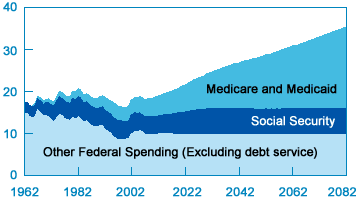Exactly. Health Care Choice Reduces Cost.
Some might say, even assume that our already unchecked health care costs would escalate; our demanding, aging population would drive the system to even more exorbitant levels.
But maybe, if doctors would provide only the kinds of care people choose for themselves, the price of medicine would go down.snip
Many patients, a.k.a. medical consumers, would choose less, at least in the way of technology, than their doctors prescribe. And more care.
Not all of us care to die in ICUs, plugged into monitors with breathing tubes in our throats and feeding holes in our stomachs. Rather, the comfort of a hands-on physician, someone who's honest and realistic, who treats what's treatable, who's kind and considerate, is more than many hope for.
I know this based on my experience as a physician who has practiced for nearly 20 years, and as a patient who's had breast cancer and other chronic medical conditions since childhood.
"Please, don't ever let that happen to me" was one of the first things I told my husband after my breast cancer diagnosis some years ago. As a physician, I'd witnessed too many people end their lives in a cloud of treatments, intended to help, but really just prolonging agony.
The U.S. spends over 2.4 trillion dollars each year on health care. Medical outlays skyrocket as patients near death; typical life-extending measures include costly procedures, medications, intensive nursing and care by multiple physicians. Medicare, the largest provider to those 65 and older, exhausts roughly a third of its $400 billion budget on end-of-life care.
Last month the journal Cancer published a troubling report revealing that a majority of U.S. doctors would only raise the subject of DNR orders, palliative or end-of-life care with patients who have metastatic cancer and a poor prognosis. The article generated considerable attention in the press for good reason - it bears on health care costs, patients' rights, doctors' communication and time constraints.
The study findings mesh with my own experiences as a practicing oncologist, when I observed that many good physicians are reluctant to stop prescribing chemotherapy and other treatments even as their patients near death. The reasons vary:
Some doctors sincerely think it's better for their patients if they stay upbeat, and this may indeed be true.
Some recognize that if you tell someone there are no curative options left, they'll go elsewhere. Most people, if they're sensible, do want to get well. And many are desperate enough to try anything if a doctor tells them it might work.
Another, unfortunate factor is financial pressure for physicians; giving treatment is far more lucrative than billing for simple office visits.
Doctors have egos, too. If you can "fix" someone thought hopeless, that's great. It's not just the patient, but your reputation at stake.
And feelings -- I've seen physicians become so invested in a case that they don't realize when therapy is useless.
Yet, maybe some dying patients would appreciate a doctor's honesty.
Labels: end of life care, health care reform, informed consent, patients' rights




